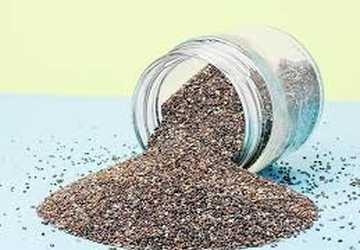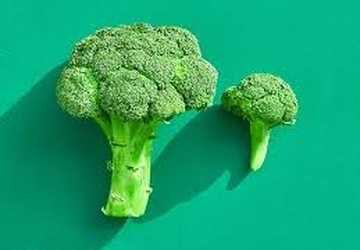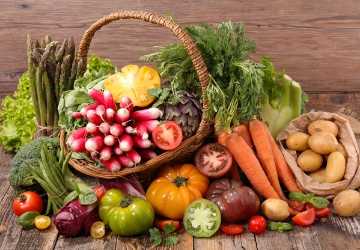7 High-Fiber Foods for Digestive Health and More
Have you been feeling bloated, constipated, or just not right in your stomach area lately? You're not alone—many people struggle with digestive issues. One simple way to help your gut health is by eating more fiber.
Have you been feeling bloated, constipated, or just not right in your stomach area lately? You're not alone—many people struggle with digestive issues. One simple way to help your gut health is by eating more fiber.
Often overlooked, fiber is a powerhouse for keeping our bodies healthy. It helps reduce the risk of various diseases, maintain a healthy weight, and keep our digestive system running smoothly.
In this blog post, we'll explore seven tasty, fiber-rich foods that can boost your digestive health.
Ready to learn some delicious tips for keeping your gut happy and healthy? Let's start by understanding the benefits of fiber!
Why High-Fiber Foods are Crucial in Your Diet?

Have you ever felt sluggish, swollen, and generally not what you do? This can be the result of a considerable fiber deficiency in your diet.
Generally, two kinds of dietary fibers are found in plant-based foods: soluble and insoluble. The first one easily dissolves in water, forming a gel that helps control blood sugar & cholesterol. The second, insoluble in nature, helps the stool to increase in bulk so that a person can move the bowel regularly.
High-fiber foods help avoid irregularity and spare your digestive system from distress, which can be unfortunate, painful, and sometimes embarrassing. But there is also a massive benefit to it.
Fiber also helps control blood sugar levels, lowers cholesterol, and may even support heart health. Without further delay, let's look at some delectable, high-fiber foods that will keep your body functioning like a well-oiled machine!
Here is the detail for each high-fiber food;
1. Avocado
It is interesting to mention that avocados are among the only fruits with high levels of healthy monounsaturated fats. In fact, from just a medium-sized avocado, about 7 grams of fiber and many nutrients are derived, namely potassium, vitamins K, C, E, and B6.
Avocado fat helps support the heart and creates satiety when combined with fiber and other good fats. Avocados are so versatile that they can be prepared in many varieties.
Add to smoothies for a creamy texture & nutrient boost, or spread the flesh on toast for a quick, tasty breakfast. Dice them into salads or use them to top eggs, grain bowls, or sandwiches for more excellent texture and flavor.
2. Chia Seeds
Chia seeds are tiny, nutritious powerhouses. In addition to providing 7 grams of fiber, About two tablespoons of chia seeds also contain a ton of protein, calcium, magnesium, and heart-healthy omega-3 fatty acids.
When added to liquid, chia seeds form a gooey-like material that might facilitate one's feeling of fullness but, on the other hand, moderate the digestive system.
Chia seeds are very easy to include in your diet. Mix a pudding with milk (dairy or plant-based) and let it soak overnight. Chia pudding will be ready the next morning or later in the day; that may be a fun breakfast or snack on the go.
You can sprinkle chia seeds over yogurts, oatmeal, or salads to add more value to the dish. Also, they can be added to the smoothie and baked items to give them more body.
3. Raspberries
Raspberries are a low-calorie, high-nutrient way to boost your fiber intake. One whole cup of raspberries delivers an outstanding 8 grams of fiber & a host of antioxidants, vitamin C, and manganese for cellular protection against damage.
Raspberries contain fiber—an ingredient in digestion support, giving constant feelings of being full. Have raspberries as a snack, or throw a handful into your breakfast bowl, parfait, or even overnight oats.
You can also incorporate them into muffins, cakes, or crumbles for an excellent little extra source of fiber with your treat.
4. Whole Grains (Barley, Quinoa)
Grains always provide excellent fiber sources. Barley and quinoa also contain vital vitamins and minerals.
Approximately 6 grams of fiber can be obtained with 1 cup of cooked barley, and about 5 grams of cooked fiber can be obtained from a cup of quinoa. It is a complete protein that provides all nine essential amino acids.
Whole grains in the regular diet help develop improved digestion, care of the heart, and support for stable blood sugar levels.
These whole grains can be easily incorporated into your diet when barley or quinoa is put in place of white rice for grain bowls.
Add to soups, salads, or casseroles for added texture and nutrition. Serve as a hot breakfast cereal sprinkled with fruit and nuts.
5. Broccoli

A nutritional superstar, broccoli tends to give more fiber, vitamins, and minerals. 1 cup of cooked broccoli has about 5 grams of fiber and excellent vitamins K and C, folate, and potassium.
On the other hand, broccoli contains a compound known as sulforaphane, which is very useful for reducing anti-inflammatory and anticancer activity.
Enjoy the rewards of broccoli by considering it steamed, roasted, or sautéed for a simple side dish. Add broccoli to stir-fries, casseroles, frittatas, or pasta dishes to make the daily fiber and nutrient intake requirement.
Make some "tots" with finely chopped broccoli, grated cheese, eggs, and bread crumbs; bake until crispy.
6. Apples
Apples provide a satisfying crunch and crisp flesh filled with dietary fiber. One medium-sized apple provides about 5 grams of fiber, mainly pectin-soluble fiber, which is known to help regulate blood sugar and cholesterol levels.
Apples are also a very good source of vitamin C & antioxidants, such as quercetin, which may help reduce inflammation and its harmful effects on the body.
Take an apple with you for a quick and healthy portable snack, or cut and toss apple slices into salads, oatmeal, or yogurt for extra crunch and fiber.
You can also bake it into pies, crisps, or cobblers for a treat that offers some nutritional benefits.
7. Sweet Potatoes
Sweet potatoes are an edible root vegetable. They contain nutritional content, including a good source of fiber, with many vitamins and minerals. A medium-sized sweet potato: 1 cup has approximately 4 grams of fiber.
These are also excellent sources of Vitamin A, which is necessary for good vision and skin. Sweet potatoes are also valuable sources of Vitamin C, Manganese, and Potassium.
Roast whole sweet potatoes in the oven with olive oil and your favorite seasonings to benefit from this healthy root. Sweet potatoes can be mashed with milk and butter, just like regular potatoes are done.
Sweet potatoes can be sliced into rounds and baked into complex chips for a healthy and filling snack.
Conclusion
High-fiber foods that can greatly improve your digestive health. Adding these fiber-rich foods to your daily diet could make a significant difference.
Start incorporating these foods gradually, as your digestive system might need some time to adjust to the increased fiber intake.
Prioritizing dietary fiber is a strong step towards better digestive health, maintaining or achieving a healthy weight, and lowering the risk of various diseases. Your body will thank you in the long run.





